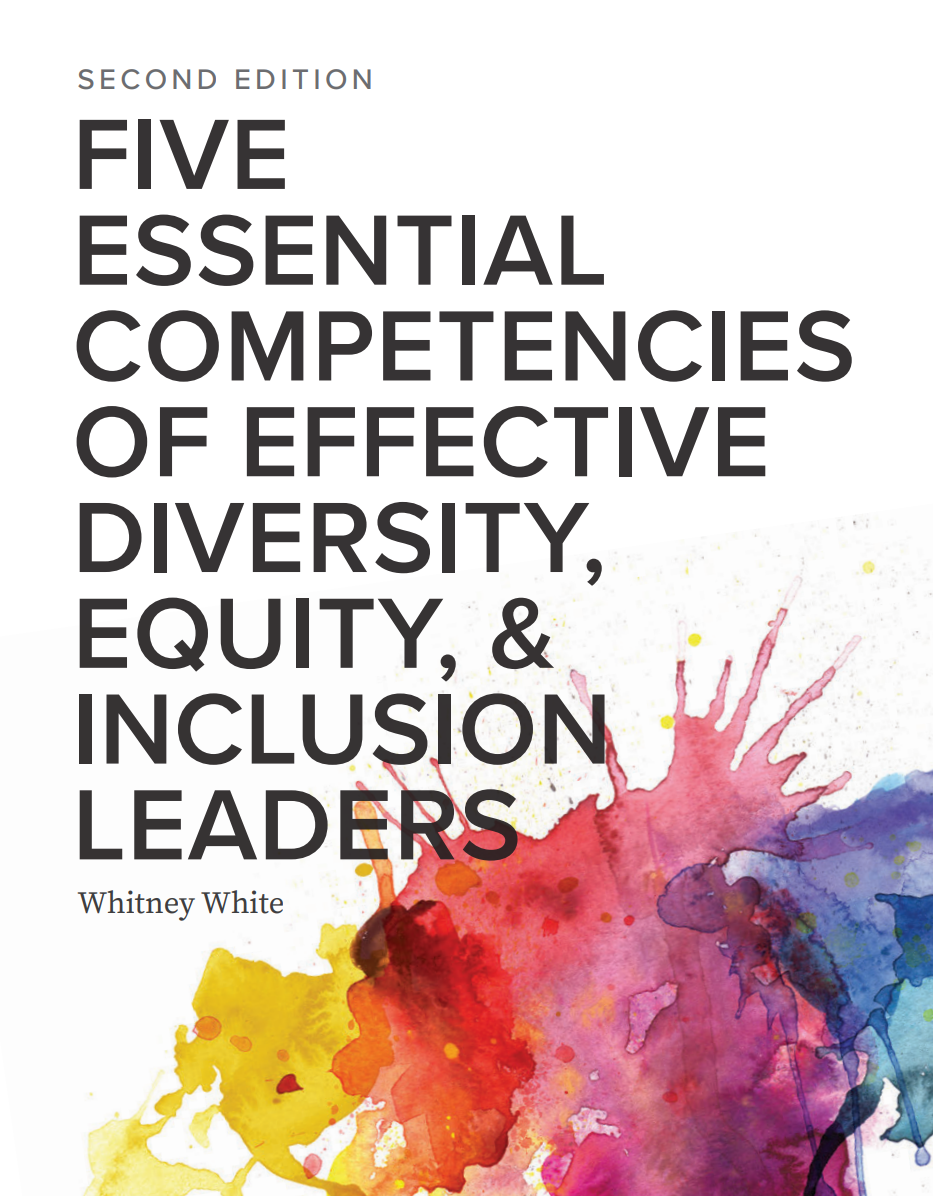We are excited to announce the release of the second edition of Five Essential Competencies of Effective Diversity, Equity, and Inclusion Leaders. This guidebook outlines key roles and responsibilities of DE&I leaders sharing what they need to know and be able to do to be effective in their role. It illuminates the top five skills and attributes identified by our research which include personal characteristics, knowledge, planning, leading, and communication. While the target audience for this guide is DE&I practitioners, all leaders including the CEO should embrace and demonstrate these competencies.
The second edition builds on the foundational content of the 2020 release. The equity section is expanded. New content was also added to the Planning section offering examples of how to gauge inclusion beyond tracking workforce demographics.

Equity
Increasing equitable outcomes is the goal for many organizations who engage in DE&I work. Advancing equity requires intentional actions to remove individual, group, and systemic barriers and biases that impede opportunities. Equity extends beyond bridging the opportunity gap and providing each person with what is needed to ensure fairness. Equity includes providing accessibility to employment, products, services, and facilities, regardless of mental and/or physical ability, socio-economic class, education, culture, race, color, gender identity, sexual orientation, ethnicity, religion, viewpoint, or age. To accomplish this, organizations must identify and eliminate messages, attitudes, behaviors, and policies that produce and reinforce unfair outcomes. The second edition provides more examples of how equity could look in the workplace focusing on:
- Representation
- Compensation and development
- Process and policy
- Website content, visuals, and communications,
- Facilities
Measuring Inclusion
Employers often create a scorecard that highlights various data points to track workforce demographics. It is equally important to establish and track inclusion measures to assess your workplace culture, especially as organizations move toward hybrid work environments. No single measure or tool can sufficiently do this. Instead, consider incorporating a combination of both quantitative and qualitative measures. Qualitative inclusion measures could include employee attitudes, the human experience, and community involvement. The second edition provides sample survey questions and tips for implementation.
Endorsements
“This content is great for seasoned DE&I practitioners as well as those who have recently begun to lead these efforts within their organizations. It provides an objective roadmap and best practices for all of us, regardless of where we are on our organizational journey… As the guidebook states, many leaders express the importance of Diversity and Inclusion within an organization. However, very few actually understand the true meaning and role of Equity. Achieving equitable outcomes requires unwavering commitment and has to be truly established over time.” — GARY ABERNATHY, Vice President, Practice Development – DE&I Practice Lead, MarshMcLennan Agency
“For leaders of business organizations who don’t have the time to read and pick out the ‘golden nuggets’ from books on workforce or societal culture, this is the best reference guide I’ve yet read…I’ve already shared the guidebook with key leaders in our organization who then used it as a framework for our DE&I business plan. Ms. White’s guidebook is a must read!” — KENT RIDDLE, CEO, Mary Free Bed Rehabilitation Hospital
“Whitney White has been an amazing guide for organizations that want to expand their work in Diversity and Inclusion. This newest version of her guidebook brings into focus the concept of Equity. What I have learned over the past few decades is that understanding and applying Equity is an essential part of any program that intends to make the workplace more collaborative and that wants to be sure everyone is participating at their highest levels. All organizations that truly want to demonstrate how they value all employee team members will benefit from using this guidebook.” — FRED KELLER, Founder and Chair, Cascade Engineering
Thank You
This project would not have been possible without the insights, experiences, and expertise shared by various DE&I leaders across West Michigan. Thank you to contributing authors RhaeAnn Booker, Jesse M. Bernal, Ph.D., Michelle Loyd-Paige, Darius Quinn, Jackie Lillie, SPHR, SHRM-SCP, Robyn A. (she/her/ella), Joseph Matthews, Abraham Carrillo, MBA, Latoya Booker, Dr. Candy McCorkle (She, Her, Hers), Kenneth James, Courtney Simmons, Dr. Brandy Lovelady Mitchell, B. Afeni McNeely Cobham, and Ann Noe!
Thank you to everyone who has read, shared, and used the content of the guidebook. We all have a role to play in educating ourselves and advancing inclusion.
Additional Resources
- Download a free electronic copy (PDF) of the guidebook: Five Essential Competencies of Effective Diversity, Equity, and Inclusion Leaders.
- Hard copies can be purchased on Amazon.
- Watch the webinars that dive deeper into leadership competencies detailed in the guidebook on this YouTube channel.
- Explore PIVOT, a collection of D&I leading practices for both informational and implementation purposes for companies across all industry sectors and sizes.
Connect with me on LinkedIn.


